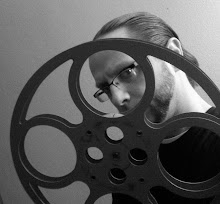Wes Anderson’s THE GRAND BUDAPEST HOTEL very much feels like
the final chapter in the first act of the stylistic writer/director’s career. Anderson
throws in everything but the kitchen sink in making this film; every trademark,
technique, prior-work, and nearly every actor he has ever worked with shows up here. It is Anderson writing a love letter to
a passing era, for himself and for the good of the film. That is the charm and
hook of THE GRAND BUDAPEST HOTEL.
Just prior to World War II, Gustave (Ralph Fiennes) is a
famed concierge at a lavish hotel on the borders of England. With war looming,
he and his Bell Boy-in-training Zero (Tony Revolori) get mixed up in a
murder-mystery and a family-inheritance feud when Madame D. (Tilda Swinton)
mysteriously dies and leaves a famed painting to Gustave.
To reveal more of the plot would be a crime, as THE GRAND
BUDAPEST HOTEL is a film about a great many things. Besides a murder mystery
and family-inheritance story, it also about a friendship/mentorship between an
adult and teen, an adolescent love story, and a cat-and-mouse game between villains
and heroes…all which unfold through the settings of the hotel, a prison (and
subsequent outbreak), a monastery, a museum, the Swiss Alps, a bakery, and a
train. It sounds like a lot as the film rapidly switches gears from one minute
to the next, but the film interweaves all the plotlines nicely. Overall
Anderson is preaching the art of storytelling. Set within the framework of an
elder Zero (played by F. Murray Abraham) recounting the adventure to an author
(played as an old man by Tom Wilkinson, and as a younger man, Jude Law), there
is a lesson of the power of storytelling on display here, and it is a strong
hook which works from the first frame to the last.
As usual, Wes Anderson has constructed a beautiful looking
film. His trademark uses of color and remarkable set-pieces are on full display,
and his camera never fails to explore every nook and cranny of every building
and every room. The exterior scenes are a throwback to the Golden Age of film;
they are put together with hand-painted backdrops and models…often looking like
a two-page spread from a pop-up book and sending the message that realism is
the last thing on Anderson’s mind. The screen format changes to mark the era
the film is taking place in as the narrative jumps around the timeline. The
shift in screen is never a distraction, as there are only a half-dozen or so
jumps, and Anderson makes great use out of the changing format. When the film
is in the old 4:3 box screen, Anderson embraces the style of 1930’s filmmaking,
and you often have to pinch yourself to be reminded that you’re watching a 2014
movie. It is a remarkable and charming bit of movie-making.
Throw out everything you ever thought you knew about Ralph
Fiennes’ acting abilities, for in this film he explores new territory. He is
funny, charming, and a little bit despicable and puts on a very memorable
performance. His counterpart, played by the young Tony Revolori, matches him
well. Adrien Brody and Willem Dafoe turn in great roles as the villains in the
story, and Ed Norton is once again marvelous as a military captain looking to
make sense of it all. The rest of the cast amounts to extended and small cameos
but are all handled well; Tilda Swinton, Bill Murray, Jude Law, Tom Wilkinson,
Saoirise Ronan, Bob Balaban, Jeff Goldblum, F. Murray Abraham, Harvey Keitel, Owen Wilson, and Jason
Schwartzman are all wonderful to watch.
THE GRAND BUDAPEST HOTEL moves along at breakneck speed, and
after a rousing climax (which includes the most hilarious gun-battle ever
filmed); the film suddenly takes a left turn and goes for the best kind of
emotional wallop; the kind that you never see coming. The ending goes for an
unexpected pull of emotion which really works, and don’t be surprised if your
theatre is dead-silent when the credits roll. After all the whimsy, THE GRAND
BUDAPEST HOTEL is ultimately about the sad melancholy we feel over things which
much pass in this world…and you don’t realize it until it is on top of you. If
this is indeed Wes Anderson checking out of the first act of his career, then
there couldn’t be a better sendoff, or more to look forward to.
BOTTOM LINE: See it


No comments:
Post a Comment
A few rules:
1. Personal attacks not tolerated.
2. Haters welcome, if you can justify it.
3. Swearing is goddamn OK.